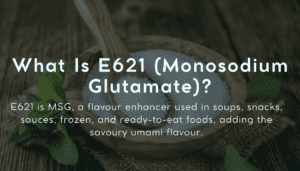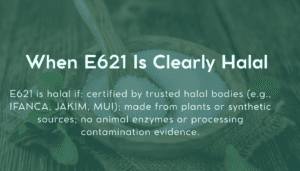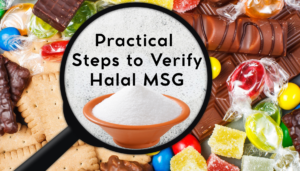It is not unusual to find additives such as E621 in the labels on packaged and processed foods. However, it is the question of people who aspire to eat in a manner that is appealing to Allahﷺ, and so the question is:
Is E621 (Monosodium Glutamate, or MSG) halal or haram?
This guide simplifies it in plain language, with proven facts, Islamic arguments, and tips you can apply before purchasing any item or eating one that contains E621.
What Is E621 (Monosodium Glutamate)?
E621 is the name of Monosodium Glutamate (MSG), a flavour enhancer commonly added to soups, snacks, sauces, frozen food, and ready-to-eat products, among other things. It adds a savoury flavour known as umami to food.
Why the Halal Status Can Vary
Contrary to whole foods (e.g. rice or dates), additives such as E621 do not necessarily have a determinate halal status. It is permissible under Islam with reference to:
1. The Source of E621
-
Plant-based fermentation: MSG is primarily produced today by fermenting plant sugars (e.g., sugar cane, beets, corn) using microbes; thus, it is not animal-derived and is halal in principle.
-
Animal enzymes: Animal proteins or enzymes may be used, in rare cases, during production. If these are from non-halal animals or involve non-halal slaughter, the MSG would be haram or doubtful.
2. Contamination Risk
Even when plant ingredients are used, cross-contamination during processing with haram substances may compromise the halal status.
👉 Key point: E621 itself is not inherently halal or haram — its ruling is based on origin and process.
What Islamic Scholars and Authorities Say
Scholarly Islamic Perspective
Islamic jurisprudence teaches that:
-
In case a substance is a product of something halal and pure, it is acceptable.
-
If it comes from something haram, it is considered haram unless a real chemical transformation (istihalah) has occurred.
According to research published in the Journal of Islamic and Religious Studies, MSG, originally derived from natural sources, may be acceptable when processed properly. But when the source’s nature is unknown, scholars suggest avoiding it.
Fatwas & Certification Bodies
Several halal authorities consider plant-based MSG generally halal:
- The South African National Halaal Authority (SANHA) has included monosodium glutamate, when fermented (i.e., using cane or beet molasses), as halaal.
- Other halal certification agencies (IFANCA, HFA, JAKIM, MUI) also permit MSG, provided that its origin and production are certified as halal.
When E621 Is Clearly Halal
E621 can be confidently considered halal when:
✅ The product has trusted halal certification (e.g., IFANCA, JAKIM, MUI)
✅ The manufacturer states it is produced from plant-based or synthetic sources
✅ There is no evidence of animal-derived enzymes or processing contamination
Many supermarket products worldwide that contain MSG are halal because they meet these criteria.
When E621 Can Be Haram or Doubtful
E621 becomes haram or doubtful when:
⚠ It is produced using animal-derived enzymes without halal slaughter
⚠ The manufacturer cannot clarify the source
⚠ There is no halal certification, and the origin is ambiguous
In Dutch halal food analyses, products with questionable additives—such as certain flavour enhancers alongside E621—are labelled mushbooh (questionable), indicating caution.
Practical Steps to Verify Halal MSG
Here’s how Muslims can confidently determine the status of E621:
1. Look for a Halal Logo
The easiest way to ensure that the product, including its additives, is permissible is to rely on the haraam certification on the packaging.
2. Read Labels Carefully
In case E621 is not accompanied by a source, do not presume halal.
3. Contact the Manufacturer
Inquire about how the product is made, particularly when you eat it.
4. Use Halal Ingredient Apps
The status of E-numbers and additives can be easily checked using ingredient-scanning apps.
Health and Moderation Perspective
Though we are talking halal or haram, it should be mentioned:
-
The FDA and other regulatory bodies generally consider MSG harmless in moderate amounts, but some individuals report reactions.
-
Islam preaches that one should moderate food intake regardless of whether it is halal or not.
Conclusion
- Halal – when of vegetal fermentation and halal-certified.
- Haram- when sourced from non-halal animals or polluted.
- Suspicious – with unknown and uncertified sources.
Summary: The MSG (E621) mostly found commercially is made by fermentation of plants and can be deemed as halal but always remember to look at certifications and transparency so that you are sure before you consume it.


